Theater Review: Noir And Hysteria Intersect In South Brooklyn Shakespeare’s Twelfth Night
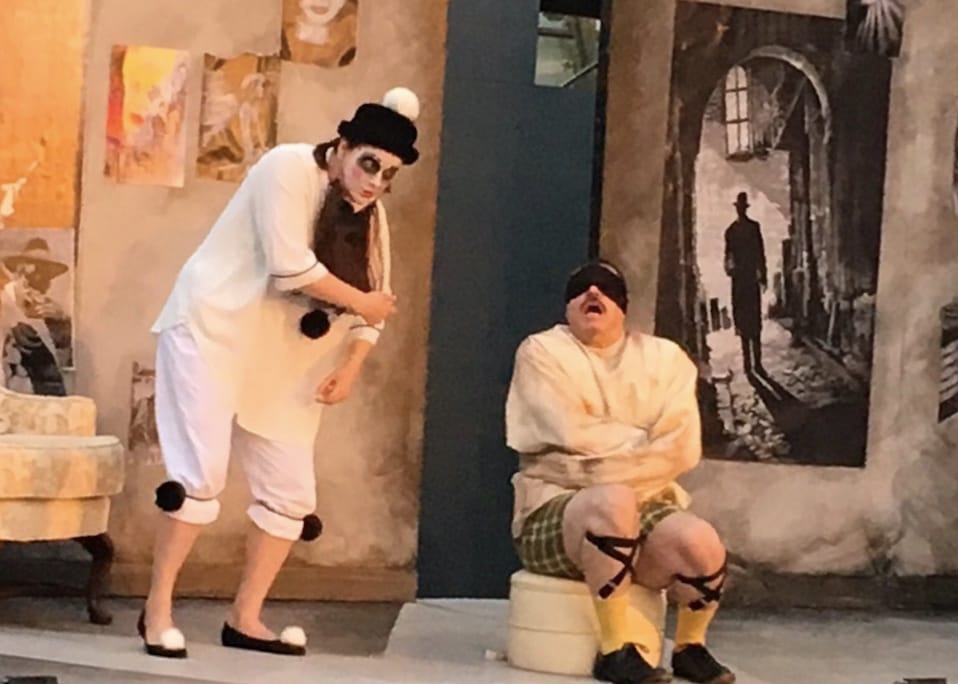
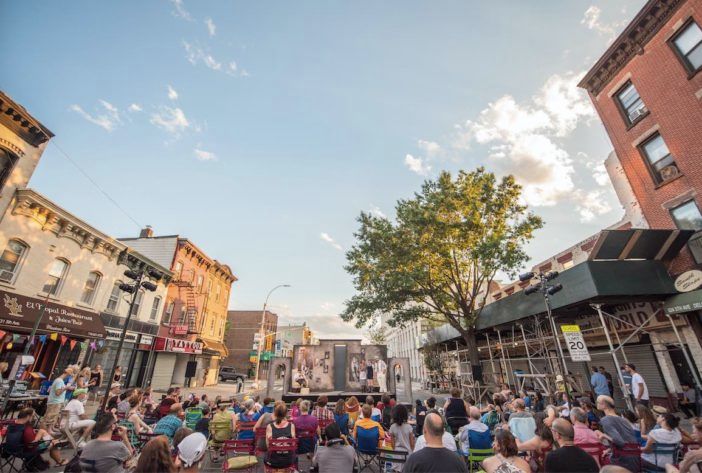
We love lists. We love categories. And Shakespeare’s canon is no different. One often sees the Bard’s plays in clean columns of genres; “comedies,” “tragedies,” and “history plays.” The term “problem play” comes up as well, as scholarship points to tonal shifts and genre mixing which prevent certain plays from falling into one of the three columns.
However, the most enticing productions of Shakespeare’s works are mounted by artists who believe all of his plays to be nuanced, textured, and complicated; because the most interesting people and interesting stories focus around people who are nuanced, textured, and complicated.
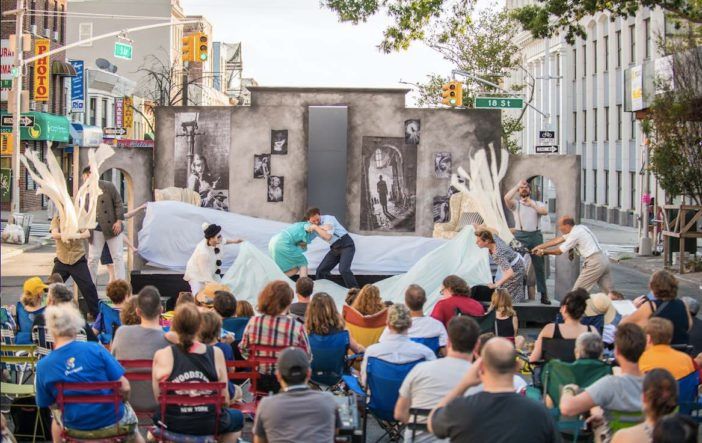
Twelfth Night opened last Saturday, the fourth production by South Brooklyn Shakespeare since their debut of A Midsummer’s Nights Dream in 2012. Co-directed by Paul Molnar and Dee Byrd-Molnar, this play follows SBS’ tradition of taking theater to the streets. Smack dab in the middle of gloriously traffic-free 5th Avenue (near 18th Street), the performance was part of the Fifth Avenue Summer Strolls Series taking place in July and August.
The play’s full name, Twelfth Night, or What You Will, is the only of Shakespeare’s works which had a subtitle when it was first published. And to Molnar, the subtitle is key.
“Twelfth Night is about the Epiphany, the coming of salvation in human form,” he told us during an interview a few weeks before the production. And to Molnar, that salvation comes in human form, as Viola (played by Heather Kelley with aplomb) is washed up on the coast of Illyria after a shipwreck.
“Illyria begins as dark and shadowy,” said Molnar, and this is clearly executed by the use of film noir costumes, black, white, and grey colors — a somberness which reflects Olivia’s (Alix McEachern Jones) mourning for the recent deaths of both her father and brother.
While Shakespeare references this fantastical country in Henry VI, Part II, Illyria is otherwise ethereal and mysterious.
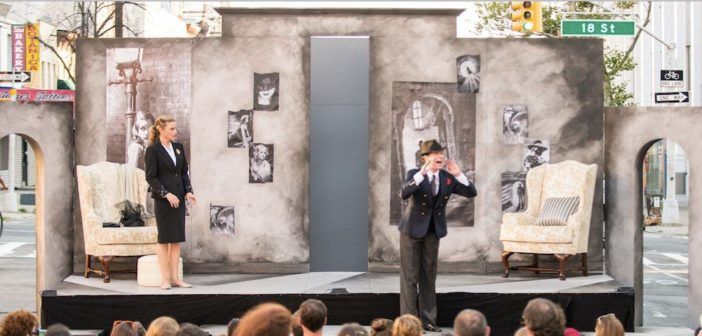
But love begins to warm the palette of the world; white rose bouquets later blossom into red. Both deep and intangible, the raw emotion and desire begin to break Olivia out of her shell. But little does she know who she pines for.
Olivia falls for Viola, who is dressed as a man. Under the guise of “Cesario,” Viola plays the messenger for Duke Orsino (Paul Molnar, displaying quite a bit of acumen for Shakespeare’s verse), who is in love with Olivia. And to complete the triangle, Viola finds herself desiring Duke Orsino.
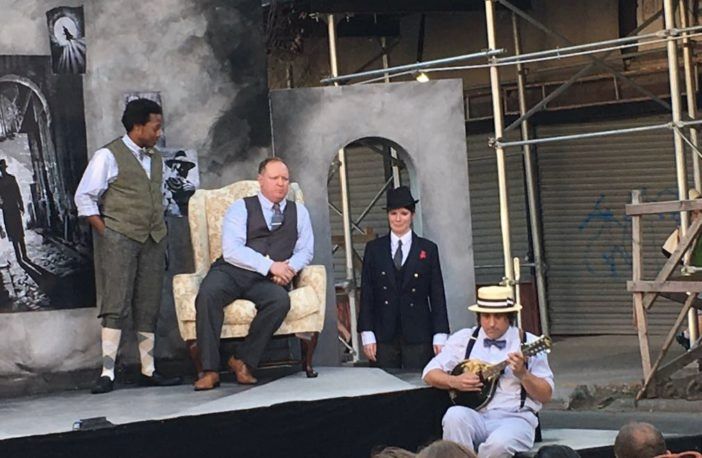
To a certain extent, McEachern Jones, Kelley, and Molnar rightfully play the “straight men” [pun not intended but inevitable when dealing with a play which deals with so much gender identity] to the broader characters.
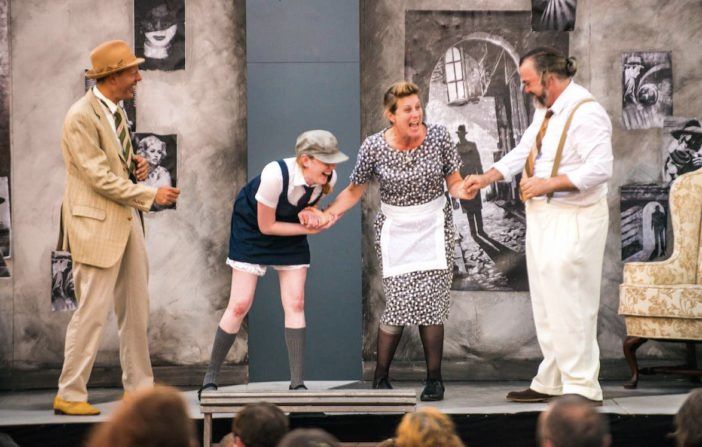
The story of lovers as fools focuses around the drunken bawdiness of Sir Toby Belch (uncle to Olivia and played with braggadocio and abounding delight by Brad Fryman), Sir Andrew Aguecheek, the foolish suitor for Olivia, (Arthur Aulisi), Maria (Dee Byrd-Molnar), and Fabian (Katie Osborn).
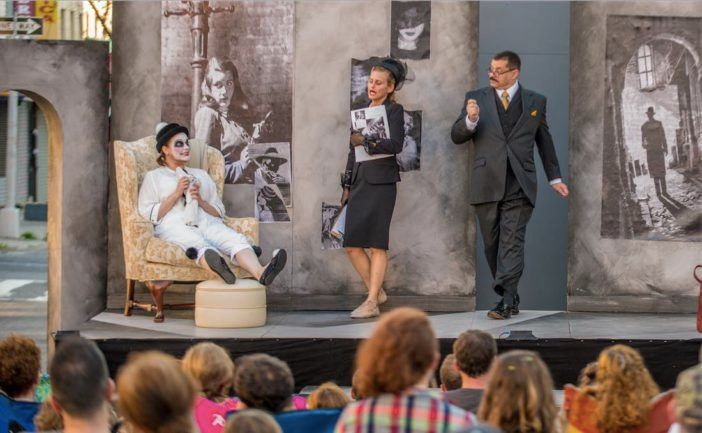
Their “victim” is Malvolio (the powerful and effective John Bergdahl), Olivia’s steward, who loathes the loud Belch and company, preferring order and decorum.
Molnar and Byrd-Molnar effectively move the scenes along with a rapid pace as they jump quickly from the more subtle love triangle to the revelry of Belch, Maria, Fabian, and Aguecheek. The group cook up a fake love letter supposedly written by Olivia which tricks Malvolio into performing acts of foolishness for her.
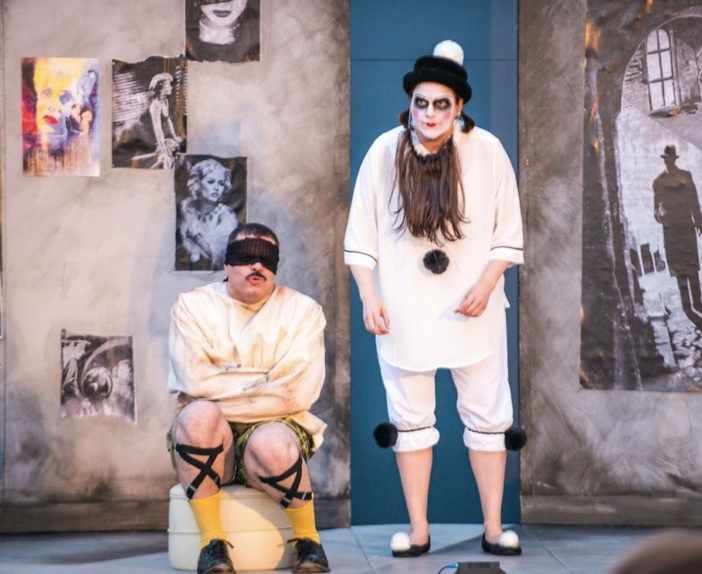
And then there’s Feste, the clown, performed by Bethany Weise, who possesses the ability to play a darkly comic and at times cruel clown. Weise counterpoints the noir by singing in a beautiful voice. Twelfth Night is perhaps the most musical of Shakespeare’s plays, and clearly this was a strong collaboration between Weisse and resident composer Gypsy George Mihalopoulos.
Weise and the rest of the wild ones expertly pull off the sadistic joke on Malvolio. Feste torments the puritanical steward, as he dons yellow stockings and cross garters which the faux letter tells him to wear for Olivia’s pleasure. It is a cruel scene, serving as an effective complement to the hysteria.
Or perhaps it’s just a different kind of hysteria.
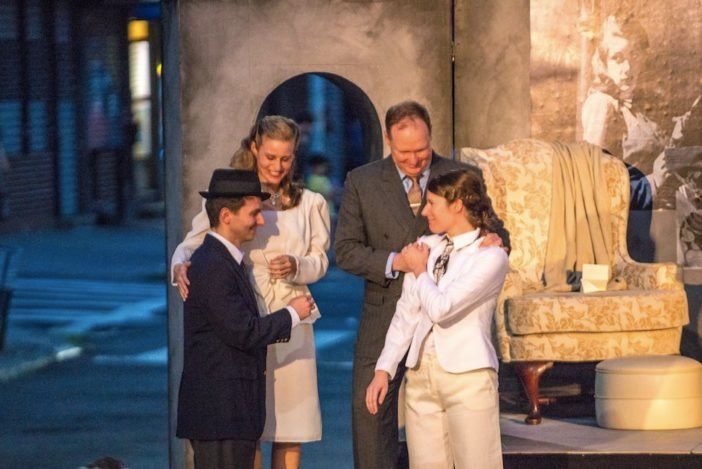
On the surface, the play ends with a series of symmetrical couplings after all the true identities are revealed. Viola removes her Cesario costume, uniting with Orsino. Sebastian (Kevin Stanfa) — Viola’s twin brother who also survived the shipwreck — marries Olivia. And the two deeply close siblings are of course united. Even Maria and Sir Toby Belch marry.
The sun has begun to set, the warm lights begin to bathe the stage, and Phoebe Minardi and Pete Ascolese’s strong costume design begins to brighten the picture.
But the world is imperfect. Malvolio exits alone, mortified, and bitter. “I’ll be reveng’d on the whole pack of you,” he tells them all. Malvolio’s exit punctuates the asymmetry of the complicated Illyria.
The production is spare, putting the emphasis on the power of Shakespeare’s language. The raised stage in the middle of the street recalls the traveling troupes of theater companies who took their talents to the street centuries ago. And the echoes of Molière’s commedia dell’arte troupe are prevalent in this production.
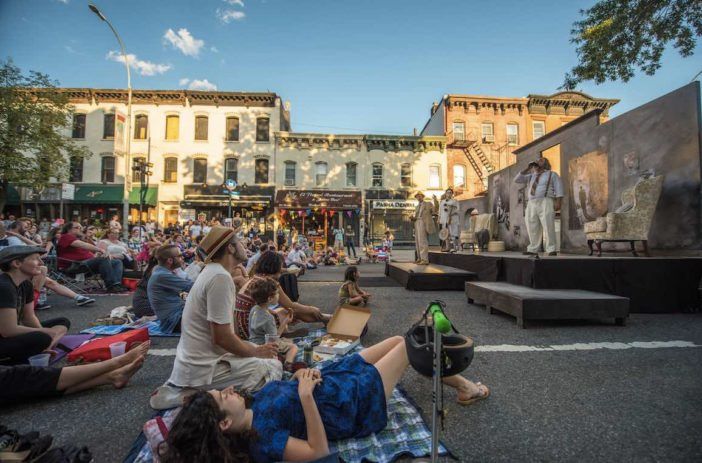
And the truth is this — Shakespeare is (dare I say!) imperfect. The character Fabian — ostensibly a member of Olivia’s household — joins the fracas late in Act II without any explanation as to why the character appears. Actress Katie Osborn wastes no time infiltrating the antics. It’s an effective way of addressing a structural solution to the play.
Twelfth Night moves north on 5th Avenue where it will set up shop at the Old Stone House for its remaining three performances on August 4-6. Get your eyes and ears over there to catch this.
If you looked closely around 5th Avenue during the performance, it wasn’t just the seated audience who were watching. Curious eyes were poking out from everywhere — the guy ordering a cheesesteak at Subs n’ Stuff who ate at the store entrance, the folks sipping a tasty brew just inside of South Pub, the cyclist passing by who slowed down to remove his helmet and wipe his dripping brow while hearing delicious language. And rightly so. SBS’ production is worthy of pause and consideration.
“Foolery, sir, does walk about the orb like the sun. It shines everywhere,” says Feste. You may be guilty of such if you miss this production.
The Next Performances: Twelfth Night performed by South Brooklyn Shakespeare
When: Thursday, August 4 – Saturday, August 6, 8pm.
Where: Old Stone House, 336 3rd Street between 4th And 5th Avenues
How Much: Free. You can donate online throughout the year to help support the company.




